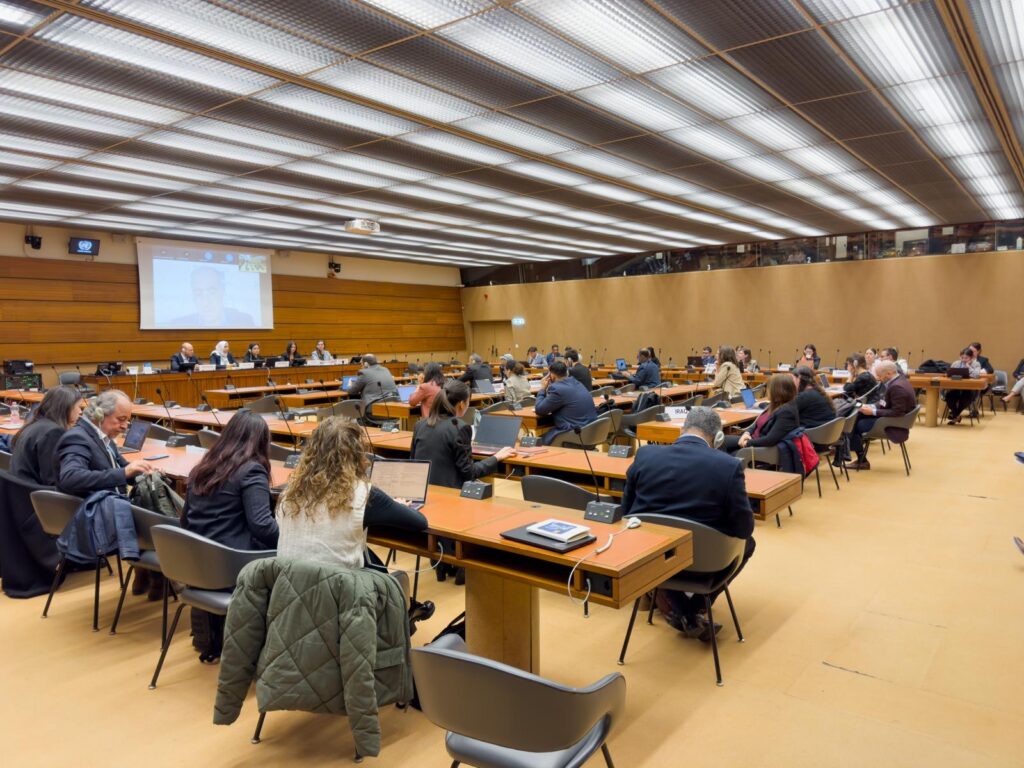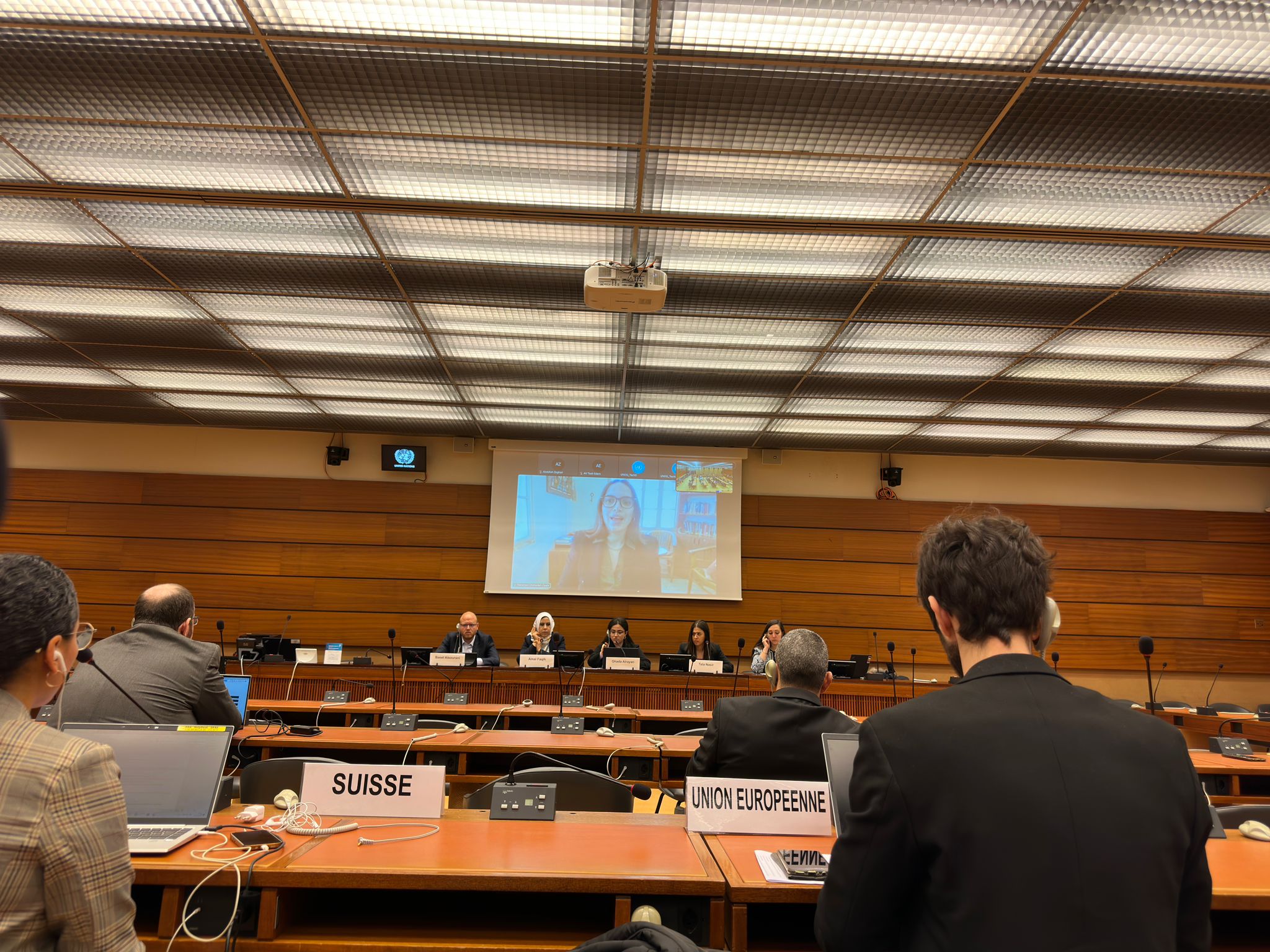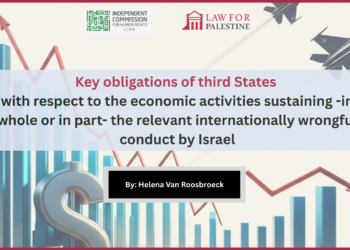During the 55th Session of the Human Rights Council, Law for Palestine, alongside several human rights organizations, including Adalah – The Legal Center for Arab Minority Rights in Israel, Palestinian Prisoners Society, Addameer Prisoner Support and Human Rights Association, Dignity – Danish Institute Against Torture, Palestinian Center for Human Rights (PCHR), and Human Rights and Democracy Media Center (SHAMS), co-organized a side event titled “Shadows of Oppression: Israel’s Detention and Torture of Palestinians in OPT and Israel.” This event, held on Monday, March 25th, 2024, aimed to shed light on the detention and torture of Palestinians within Israeli detention facilities.
The live-streamed event addressed ongoing reports of atrocities, including widespread detention, torture, and sexual assault in Gaza, as well as the surge in administrative detention orders post-October 7, 2023. It also discussed systematic violations by Israel, such as arbitrary detentions in the West Bank and arrests of Palestinian citizens of Israel and Jewish Israelis opposing Israel’s actions in Gaza.
Attended by representatives from 10 delegations to the UN, including the European Union, Canada, and Switzerland, the event featured a panel moderated by Ghada Alrayyan, Human Rights Coordinator at Law for Palestine. The panel included five notable speakers: Amal Faqih, Executive Director of SHAMS; Abdullah Al-Zaghari, Head of the Palestinian Prisoner’s Society; Basel Alsourani, International Advocacy Officer at PCHR; Tala Nasir, Human Rights Lawyer at Addameer; Nareman Shehadeh Zoabi, Attorney in the Civil Political Rights Unit at Adalah; and Natacha Bracq, Legal Advisor at Dignity. Each speaker provided insights into the oppressive policies faced by Palestinians across different geographical areas.

Amal Faqih: Updates on the Status of Palestinian Prisoners
Amal Faqih initiated the discussion by highlighting Israel’s distinctive stance as the sole nation to legalize torture, ranking third globally in the production and exportation of torture tools. She underscored the justification of torture under the pretext of combating terrorism, emphasizing the grave toll it exacts on Palestinian prisoners, resulting in the tragic deaths of 14 individuals since October 7th.
Faqih exposed the harrowing ordeals endured by Palestinian detainees from Gaza and the West Bank, including women and children, subjected to a spectrum of abuses, including physical assaults, forced nudity, sexual harassment and denial of essential medication. She further elucidated on the dire predicaments faced by families of prisoners, enduring investigations, assaults, shootings and house demolitions.
Tala Nasir: The plight of Palestinian prisoners in the West Bank and Jerusalem
Tala Nasir tackled the plight of Palestinian prisoners in the West Bank and Jerusalem, addressing the alarming escalation of Israel’s arrest campaign. With 7760 Palestinians detained since October 7th, including women, children, journalists, and legislators, Nasir condemned Israel’s use of administrative detention and charges of incitement as means to silence dissent against the ongoing genocide in Gaza and curtail freedom of expression.
Moreover, Nasir shed light on the abysmal conditions within Israeli prisons, marked by starvation, water shortages, severed communication, and widespread ill-treatment. She underscored the systematic deployment of oppressive measures, indicative of the egregious violations perpetrated against Palestinian detainees.
Abdullah Al-Zaghari: Testimony Revealed from Israeli Prisons
Mr. Al-Zaghari underscored a significant discrepancy in the reported death toll of detainees in Israeli prisons since October 7th. While official records cite 14 deaths, the Palestinian Prisoners Society for Human Rights (PPSMO) contends that the actual number surpasses 27 due to Israel’s policy of forced disappearances. During his address, Al-Zaghari shared a chilling account of the deliberate killing of prisoner Thaer Abu Asab.
According to an eyewitness inmate present during the tragic incident on August 18, 2023, at 7:00 pm, Israeli occupying forces conducted a security count of prisoners. When Thaer inquired about a potential ceasefire in Gaza, the jailer ominously deferred his response. Subsequently, approximately 20 heavily armed soldiers stormed into the cell, subjecting all inmates to severe beatings for a harrowing 15 minutes. The assault resumed, rendering several prisoners unconscious, including Thaer, who suffered a fatal blow to his head. Medical assistance was withheld until January 15th, 2024, when it was belatedly confirmed that Thaer had succumbed to his injuries.
In a plea to the international community, Al-Zaghari urged for concerted pressure on Israel to conduct thorough investigations into the conditions within Israeli prisons and the circumstances surrounding prisoners’ deaths. Additionally, he called upon the International Committee of the Red Cross (ICRC) to assume responsibility and advocate for the reactivation of its crucial role as the sole international body authorized to visit prisons.
Basel Alsourani: Revealing Horrors Faced by Gaza Prisoners
During his speech regarding Gazan prisoners held in Israeli custody, Sourani highlighted the systematic torture embedded within a broader genocidal campaign. Reports indicated that between 15,000 to 20,000 Gazans holding work permits in Israel were detained post-October 7th, whether at home, work, or while attempting to flee to the West Bank. Sourani referenced 35 testimonies detailing the torture endured by Gazan workers and detainees in Israeli detention facilities. Additionally, thousands of prisoners from Gaza are categorized as unlawful combatants, denying them legal representation or contact with family members.
Sourani also brought attention to instances of sexual abuse against women, including cases where children were forcibly separated from mothers for DNA testing. Disturbingly, women in Israeli prisons were reportedly beaten if found sleeping after being anesthetized. Alsourani emphasized a distressing pattern of violence against Gaza detainees, noting consistent handcuffing, blindfolding, threats, coerced confessions, forced nudity, and exposure to harsh weather conditions. Tragically, 27 Palestinians died as a result of torture within Israeli prisons, yet their identities remain undisclosed.
Nareman Shehadah: Palestinians in Israel – Facing Internal Oppression
In her discussion of the predicament of Palestinian prisoners and residents within Israel, Shehadah emphasized the systematic political persecution endured by Palestinians, citing severe limitations on freedom of expression and peaceful assembly. She attributed this suppression to a concerted effort involving extreme right-wing groups, government officials, and various Israeli institutions, including ministries such as the Ministry of Health and Ministry of Education, targeting individuals expressing solidarity with Gaza.
Shehadah outlined a comprehensive strategy employed against Palestinian protestors, social media users, university students, and employees, branding Palestinians as “enemies from within” to deter expressions of identity or solidarity. She highlighted the use of excessive force against protestors, noting that even human rights defenders and community organizers face severe charges under counter-terrorism laws. The speaker also detailed the targeting of activists, underscoring its chilling effect on the broader Palestinian population. Arrests, she described, were often brutal, conducted covertly under the cover of night, with detainees subjected to blindfolding and degrading treatment.
Shehadah further addressed the application of counter-terrorism laws, clarifying that Palestinians imprisoned under such legislation are categorized as security prisoners. This policy, she argued, represents discrimination against Palestinians compared to the treatment received by Israeli prisoners.
Natacha Bracq: Unveiling Alarming Trends from Neurological Damage to Loss of Life
Bracq opened her address by shedding light on the longstanding prevalence of torture, even before October 7th, emphasizing that the current situation represents a worsening of established policies and practices. She highlighted the potential classification of acts of torture and ill-treatment as war crimes or crimes against humanity, particularly when part of a systematic attack against Palestinians. Bracq also suggested that such actions could qualify as acts of genocide, especially if carried out with the intent to wholly or partially destroy the Palestinian group.
In her examination of conditions within detention facilities, Bracq outlined a disturbing pattern of torture and ill-treatment inflicted upon Palestinian prisoners. These abuses ranged from physical assaults to electric shocks and cigarette burns, accompanied by the denial of basic human rights such as access to food, water, and sleep. She delved into the psychological torment experienced by detainees, including threats against them and their families, along with ongoing humiliation. Bracq emphasized the profound impact of such psychological violence, which often leads to chronic pain, disability, neurological damage, and even loss of life.
The speakers concluded their speeches with a resounding call to action, urging all UN member states, international organizations, and the global community to investigate the situation of Palestinian prisoners and hold Israel accountable for committing grave war crimes through the excessive use of force against them. They emphasized the importance of international laws criminalizing ill-treatment and torture, highlighting the systematic violence experienced by various segments of the Palestinian community and calling for concerted efforts to combat impunity.
Event full recording:
torture Palestinian prisoners Israel oppression Detention Torture Palestinian prisoners Israel oppression Detention





